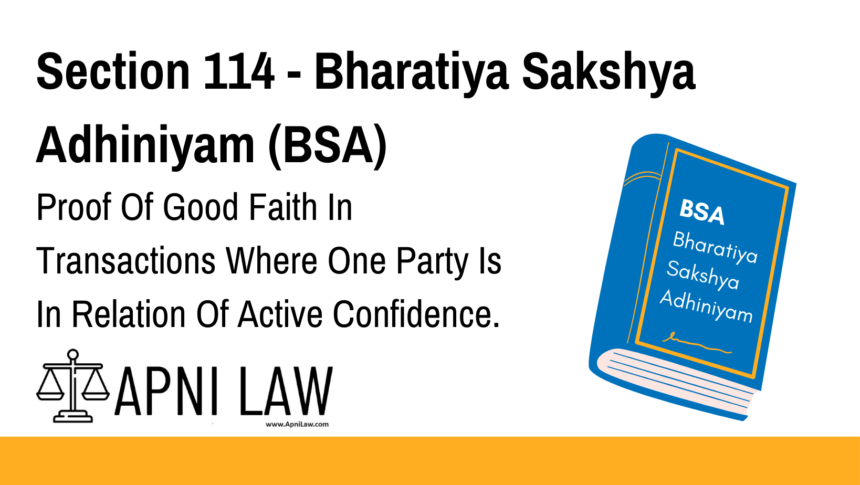Code: Section 114 BSA
Where there is a question as to the good faith of a transaction between parties,
one of whom stands to the other in a position of active confidence, the burden of proving
the good faith of the transaction is on the party who is in a position of active confidence.
Illustrations.
(a) The good faith of a sale by a client to an advocate is in question in a suit brought
by the client. The burden of proving the good faith of the transaction is on the advocate.
(b) The good faith of a sale by a son just come of age to a father is in question in a suit
brought by the son. The burden of proving the good faith of the transaction is on the father.
Explanation of Section 114 BSA
Section 114 deals with transactions between parties where one has a position of trust or influence over the other. If the good faith of the transaction is questioned, the party in a position of active confidence must prove the transaction was made in good faith.
This rule ensures fairness, as the party with more control, such as a lawyer or parent, must show that their actions were honest and just.
Illustrations
Example 1: Sale Between Client and Advocate
A client questions the good faith of a sale made to their advocate. Here, the advocate holds a position of active confidence and must prove the sale was fair and conducted in good faith.
Example 2: Sale Between Father and Son
A son, who has just come of age, questions the good faith of a sale made to his father. In this case, the father, who holds a position of trust, must prove the transaction was done in good faith.
Common Questions and Answers on Section 114 BSA
1. What does Section 114 require?
- Answer: Section 114 places the burden of proving the good faith of a transaction on the party in a position of active confidence.
2. Who is considered in a position of active confidence?
- Answer: A person in a position of active confidence is someone who holds a trusted role, such as a lawyer, guardian, or parent, in relation to the other party.
3. What happens if the party in a position of active confidence fails to prove good faith?
- Answer: If the party fails to prove good faith, the transaction may be seen as unfair or invalid.
Conclusion
Section 114 of the Bharatiya Sakshya Adhiniyam (BSA) protects fairness in transactions where one party holds a position of trust. It ensures that the party with greater influence must prove the good faith of the transaction when it’s questioned.











